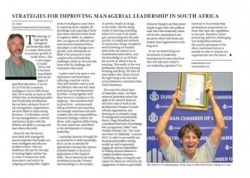Strategies for improving Managerial Leadership in South Africa- Jon Taylor2014-12-17 Strategies for improving Managerial Leadership in South Africa
2014-12-09 Jon Taylor: Industrial/Organisational Psychologist The shortage of high quality managerial and leadership skills is a major obstruction to economic growth in South Africa. This is not unique to South Africa, but it has been exacerbated here by the legacy of apartheid education. A survey of CEOs by the Economist Intelligence Unit in 2006 found that CEOs devote as much as 50% of their time on developing leaders and if leadership development has not been a primary focus of top management, organisations are more likely to make wrong decisions. It is therefore critical for top management to cultivate and nurture leaders with the abilities and skills to manage and lead others effectively. Research into the factors associated with managerial success indicates that leaders are more intelligent and effective problem solvers. They are ambitious (not just for the sake of earning higher salaries but in order to master new work experience), and tend to be outgoing and adaptable. Higher levels of intelligence assist them in acquiring more complex job knowledge and acquiring it faster than those who have lower levels of cognitive ability. In addition, they can figure out difficult and unstructured situations better, and adapt to task changes more quickly. Such individuals are likely to be attracted to more complex jobs and leadership challenges, which in turn provide them with the challenge and stimulation they need. Leaders tend to be open to new experiences and innovation, reflecting a need for variety. They will therefore tend to seek out different roles and will enjoy participating in developmental activities. Going together with these factors is a tendency to be outgoing - this manifests itself as proactivity - spontaneously taking initiatives and assuming increasingly important and more complex roles and responsibilities. Research findings confirm the above, with cognitive ability being the most important contributor to the development of strategic leadership. Leadership develops through the accumulation of work experience, but it can be accelerated by appropriate training that exposes potential leaders to practical applications of the required skills. This is based on the wellestablished principle (Dewey) that knowledge is a by-product of activity. People do things in the world, and this doing results in learning something, which if it is seen to be useful, gets carried along into the next activity. In traditional methods of instruction, things considered worth knowing are handed down from the instructor as disembodied information, and this knowledge is cut off from the activity in which it has its meaning. This results in the very problematic distinction between knowing and doing. We have all seen leaders who claim to know the right thing to do, but their actual behaviour contradicts their stated intentions. This raises the critical issue of leadership values. Are there universal leadership values that apply in all cultures? Based on over forty years of work in the development of leaders in South African organisations, and drawing on an extensive range of management and leadership theory, Hugo Misselhorn has crystallized this body of knowledge into a programme called "Joint Problem Solving" (see "The Head and Heart of Leadership", Amazon 2012). In order to successfully use his proposed problem solving model, we need to genuinely engage all relevant stakeholders in finding rational solutions to complex problem situations. Underlying values of integrity and respect for others are critical for the engagement of others in good faith. However if leaders use their power simply to gain their own political ends, then their leadership values will involve manipulation and deception which will divide and weaken their organizations in the long term. So are we maximizing our investment in leadership development by selecting those who will add most value to our leadership pipelines? It is essential to focus leadership development programmes on those who have the capabilities to succeed. Therefore, before promoting staff into challenging new leadership positions, the careful assessment of the above mentioned factors is needed in order to sustain our organisations into the future. jon@adsteam.co.za www.adsteam.net |
Strategies for improving Managerial Leadership in South Africa- Jon Taylor
Copyright © 2024 KwaZulu-Natal Top Business
